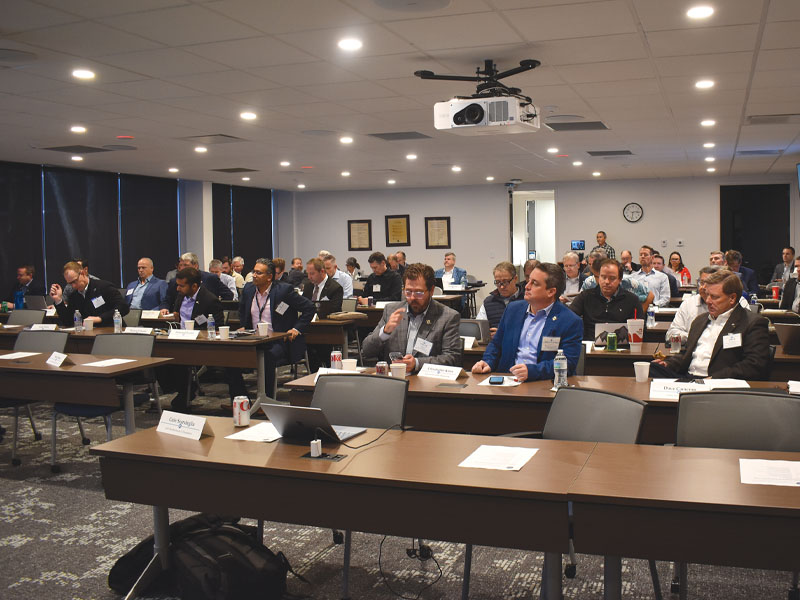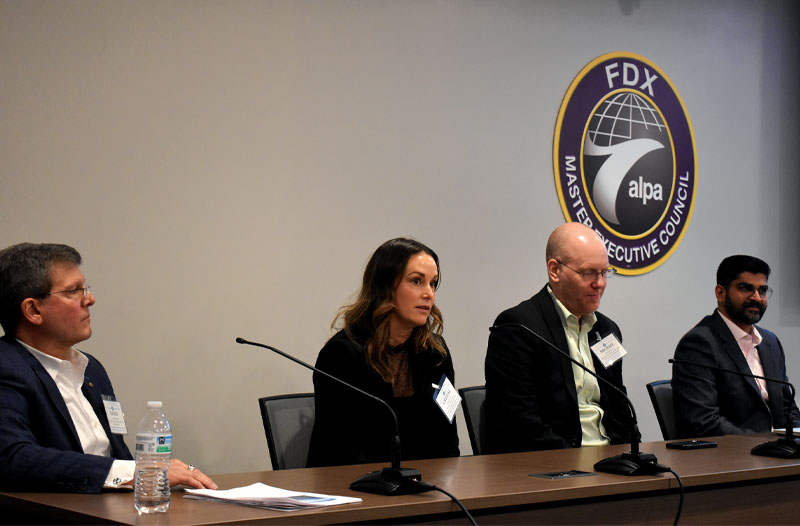Pilots Meet in Memphis for Three-Day ALPA Symposium on Air Cargo
Discussion Focused on One Level of Safety and Security for All Pilots
By Gavin Francis, Senior Aviation Writer

Representatives from various pilot labor groups, government, and airlines gather to discuss safety and security issues within the air cargo industry at ALPA’s Air Cargo Symposium hosted by the FedEx Express Master Executive Council in Memphis, Tenn.
Cargo pilots representing pilot groups from across the U.S. and Canada met in Memphis, Tenn., on January 30–February 1 for ALPA’s Cargo Symposium. More than 70 participants gathered at the FedEx Express Master Executive Council (MEC) offices to discuss issues affecting the air cargo industry and share ideas about how best to address challenges confronting cargo pilots. Discussions focused on safety and security, but attendees also had an opportunity to hear from experts about economic and financial trends within the industry. Capt. Bill Secord (FedEx Express), an ALPA executive vice president, served as emcee for the event.
“The outlook for the movement of cargo continues to be strong; however, it’s not without challenges, particularly with regard to safety and security,” said Capt. Wendy Morse, ALPA’s first vice president who also serves as the Association’s Air Safety Organization (ASO) national safety coordinator. “As the largest representative of cargo pilots, ALPA knows firsthand that the challenges we face can only be addressed effectively together, along with the combined efforts of every cargo industry stakeholder. The Association’s new biennial cargo summit is an example of ALPA’s commitment that will no doubt lead us to the changes that will enhance the safety, security, and sustainability of our profession and ensure the future success of the industry.”
During his remarks, Capt. Jason Ambrosi, ALPA’s president, recognized Capt. Rich Hughey (FedEx Express), ALPA’s Cargo Committee chair, for his leadership in supporting ALPA’s all-cargo pilot groups. He also thanked the FedEx MEC, and specifically Capt. Billy Wilson (FedEx Express), his pilot group’s MEC chair, for hosting the symposium, which provides a forum for labor, as well as government and industry, to come together to discuss cargo-specific issues.

Capt. Rich Hughey (FedEx Express), far right, ALPA’s Cargo Committee chair, leads a panel on “Industry Threats to the Cargo Pilot.” Also pictured from left are panelists Capt. Mike Sterling (Air Transport International), Capt. Shane Neville (Cargojet), Capt. Jeremy Keyes (Kalitta Air), and Capt. Yngve Paulsen (Atlas Air).
“While some of us in the room fly all-cargo operations and others fly both passengers and cargo, we stand together as one in working to advance a stronger piloting profession,” said Ambrosi. “Our solidarity is what allows us to lead collaborative efforts like this symposium to enhance aviation safety and security around the globe, throughout the airline industry, and across the table with regulators and airlines.”
ALPA has long advocated for one level of safety and security across the spectrum of airline flight operations, arguing that all-cargo pilots operate the same equipment, fly the same routes, and use the same airports as passenger flight operations. The Association continues to push for legislative and regulatory change to achieve this goal. Ambrosi also took the opportunity to speak about an issue that threatens aviation safety for all pilots, regardless of the type of operations they fly: reducing the number of crewmembers on the flight deck.
“The safe outcome last year of a near miss by a FedEx aircraft and a Southwest flight in Austin makes clear that our industry needs to match the reality of the operating environment with one level of safety and security for all who share it. But the lesson goes far beyond the importance of one level of safety,” Ambrosi observed. “The Austin near miss, along with the Alaska Airlines Flight 1282 door-plug accident and countless other safe outcomes, reminds us of the lifesaving value of having at least two pilots working on the flight deck at all times. Reduced-crew operations is a tipping point—for our profession and for the safety of our skies. The scale of this threat should make everyone in this room sit up and take notice—and want to fight back.”
Ambrosi’s message echoed the sentiments of panelists during a discussion he later moderated about the threat of reduced-crew operations. Panelists included Secord, who serves as ALPA’s Reduced Crew Operations Committee chair, Priya Doobaree from the International Federation of Air Line Pilots’ Associations, Kirk Vining from Boeing, and Capt. Bob Brown from the Independent Pilots Association. Cargo pilots are particularly vulnerable to the threat posed by the reduced-crew concept or extended minimum crew operations. Successfully persuading regulators to allow such flying would likely mean implementation first in cargo operations with passenger flights to follow. ALPA continues to aggressively push back against this threat through a collaborative global approach with other pilot associations.
Throughout the symposium, other threats to cargo pilots were also examined. Hughey moderated a panel that included Capt. Shane Neville (Cargojet), Capt. Jeremy Keyes (Kalitta Air), Capt. Mike Sterling (Air Transport International), Capt. Dave Cameron (Atlas Air), Capt. Yngve Paulsen (Atlas Air), and Dave Semanchik, a senior managing attorney in ALPA’s Legal Department. Neville discussed the concerning practice by some U.S. and Canadian carriers of operating across borders under an interchange agreement between them. This arrangement makes it possible for a U.S. carrier to operate a Canadian carrier’s Canadian-registered aircraft inside the U.S. using the U.S. carrier’s crew through a short-term aircraft lease arrangement.
“I think that’s a business model we might have some questions about,” said Hughey. ALPA previously petitioned the Department of Transportation to take a detailed look at such arrangements, particularly as it related to the economic and operational relationship between Cargojet and 21 Air.
Neville also participated in a later discussion focused specifically on cargo operations in Canada, along with Capt. Mohamed Rashid (Air Canada) and Capt. Steve Kurzbock (WestJet). Canadian cargo pilots often face unique challenges related to geography, harsh weather conditions, and remote operations, as well as regulatory requirements imposed by Transport Canada that may differ from those under which their U.S. counterparts operate.
Ben Supko, the FAA’s acting deputy associate administrator for Security and Hazardous Materials Safety, joined the symposium virtually to provide the keynote address. He gave a comprehensive overview of his division, which is tasked with protecting the national airspace system through identification, analysis, and response to security threats and safety risks.
“We engage across the Department of Transportation with our partners in all modes to try to pool our resources,” said Supko. “Hazardous materials programs are generally never very big, so the more people you can get involved with your approach, the better. We try to look across what we’re seeing in our individual modes and come up with a list of stakeholders to engage with. We did 68 stakeholder engagement events last year, which is astronomical compared to where we started initially, maybe doing only two or three a year.”
With the proliferation of lithium batteries in air cargo shipments, there was much discussion regarding the safe shipment of dangerous goods. The problems associated with carrying such cargo has underscored the importance of proactive risk management and fire-suppression technologies. Capt. Dave Schlichting (FedEx Express); David Wroth, director of Data Science for UL Standards & Engagement; and Brown participated in a discussion about lithium batteries and the Thermal Runaway Incident Program. Another panel led by Capt. Scott Schwartz (FedEx Express) focused on cargo fire suppression and the need for quality safety management systems (SMS) and included FAA representatives Dhaval Dadia, Michael Givens, and Crystal Fallin, as well as David Frassinelli, SMS manager for FedEx Express. The FAA and the International Civil Aviation Organization have established regulations and guidance specifically addressing the transportation of hazardous materials and dangerous goods by air. Despite this, enforcing safety standards and regulatory compliance remains a challenge, as does the harmonization of standards and regulations internationally.

From left, David Frassinelli, the safety management system manager for FedEx Express; Crystal Fallin, an FAA operational safety analyst; Michael Givens from the FAA Office of Hazardous Materials Safety; and Dhaval Dadi from the FAA Fire Safety Branch participate in a panel discussion on cargo fire suppression and the need for quality safety management systems.
Capt. Bill Schild (FedEx Express), who serves as ALPA’s ASO Aviation Security subject-matter expert for cargo, moderated a panel that touched on various aspects of security, such as the lack of intrusion-resistant flight deck doors or primary barriers on cargo aircraft, admission to the flight deck, and vetting of foreign national animal handlers. Discussion also included the need to reconstitute H.R. 3909, the Cargo Flight Deck Security Act of 2023, which didn’t make it into the FAA Reauthorization Act of 2023. Capt. Darrin Dorn (Alaska), ALPA’s Aviation Security vice chair; Capt. Preston Greene (FedEx Express), ALPA’s Cargo Committee vice chair; Capt. Bill Cason, director of Safety for the Coalition of Airline Pilots Associations; and Dan Kuhn from the Federal Flight Deck Officer (FFDO) program participated on the panel. Topics included discussion of a new senior-level status for longtime FFDOs who wish to undergo additional training. The first senior class for FFDOs is scheduled for this June.
Participants also heard from Aircraft Rescue and Firefighting (ARFF) Chief Rick Kiphut who leads the fire-rescue units for FedEx in Memphis. He presented information regarding the different levels of services and staffing available at airports, including their capabilities and limitations. Learning about ARFF from a firefighter’s perspective can provide cargo pilots with valuable insights and skills that enhance their ability to respond effectively to emergencies, collaborate with ARFF teams, mitigate risks, and ensure the safety of their aircraft.
But it works the other way, too. “We learn a lot from talking to flight crews and maintenance after responding to a call,” said Kiphut, who noted that his department responded to approximately 60 ARFF-related calls in 2023. “It’s an opportunity for us to find out more about aircraft systems and how those systems interact with one another.” He also stressed that cargo operations aren’t counted in the index for ARFF equipment and staffing levels at airports. “That’s something to keep in mind if you have an emergency. You may be flying into a place where you’re going to get less of a response than you’re expecting.”
Guillermo Ochovo, consulting director with Cargo Facts, an air cargo consulting company, provided an in-depth market briefing and economic outlook. Citing a 38 percent increase in the e-commerce market over the next five years, he indicated that e-commerce activity is one factor that continues to drive global air cargo growth.
“E-commerce and air freight go hand in hand, and we estimate that about 20 percent of global air cargo volumes are linked to e-commerce.” Ochovo also highlighted other factors that can influence the air cargo industry, such as consumer trends, fuel prices, global trade policies, and geopolitical events. Overall, the industry is expected to see continued growth in the decades to come, increasing the world’s freighter fleet to approximately 3,900 in 2042, up from 2,430 aircraft today.
Paul Karg, a manager in ALPA’s Economic & Financial Analysis Department, provided a financial assessment of the air cargo industry from a labor perspective. While his analysis showed a mixed outlook, it confirmed continued growth in e-commerce and suggested that all regions are expecting cargo growth in 2024, with global growth at about 4.5 percent.
Other panels included a discussion moderated by Capt. Steve Jangelis (Delta), ALPA’s Air Safety chair, regarding safety and security deficiencies in cargo operations, specifically when relying upon cost-benefit analysis for decision-making, and the resulting split in commercial aviation between passenger and cargo. That panel included Schwartz, Hughey, Sterling, and Capt. Rob Bassett (FedEx Express). Bassett also led a later discussion about fatigue risk management, which included Rashid; Cameron; Capt. Doug Marchese (JetBlue), the new chair of ALPA’s Flight Time/Duty Time Committee; and Capt. Mike Kendrick (JetBlue). Fatigue continues to be a challenge with cargo pilots who are carved out of improved flight-time/duty-time regulations for U.S. passenger carriers.
“As we go forward, I hope that each of us will carry with us the spirit of collaboration that’s been the cornerstone of this gathering,” said Morse during closing remarks concluding the three-day symposium. “The challenges we face in the air cargo industry are multifaceted and ever evolving. Addressing these challenges to achieve one level of safety requires a concerted effort from all stakeholders, including labor, government, and industry.”

